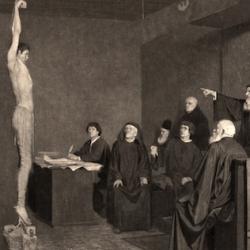John Walton’s discussion of Intelligent Design is a mess (The Lost World of Genesis 1). He writes, “The difficulty they face is that if there is intelligent design, there must logically be an intelligent designer” (126). That inference is not a “difficulty,” but one of the aims of the project.
He goes on, “Given the existence of a designer, it would logically be inferred that such a designer is not simply playing games or being artistic, but working with a purpose. Science is not capable of exploring a designer or his purposes” (126). Later, he adds that ID “does not contribute to the advance of scientific understanding because it does not offer an alternative that is scientifically testable and falsifiable” (126). He admits that it might contribute “a critique of the reigning paradigm” from within the scientific paradigm, but in the end it “can only offer inferences regarding science that can only be tracked currently by leaving the realm of science” (126).
But throughout Walton operates, sometimes explicitly, with a definition of science as “science-as-currently-constituted.” But that is precisely what ID challenges, and it is “unscientific” only on what it considers a truncated understanding of science that excludes purpose. The notion that even current scientific investigation rigorously excludes purpose is ludicrous on the face of it. Someone, if memory serves, once wrote a book on the selfish gene.
Walton’s own book provides sufficient reason to question not just scientific theories but the demarcations of the realm labeled “science” when he admits that the division of primary and secondary causes is “essentially unbiblical.”Walton is aware that scientific theories come and go, yet he accepts the current parameters of science as they stand. Scientific theories are variable, but the realm of what is labeled “science” is settled for the ages.











